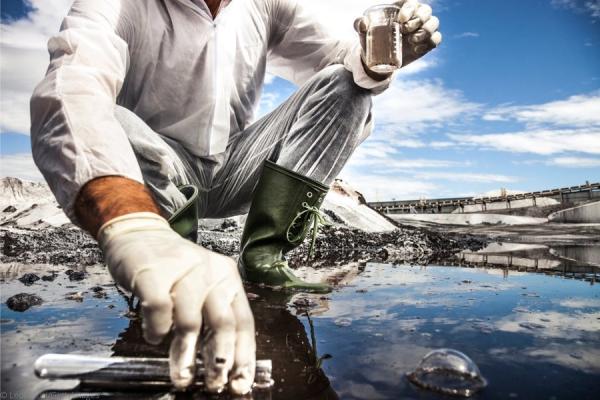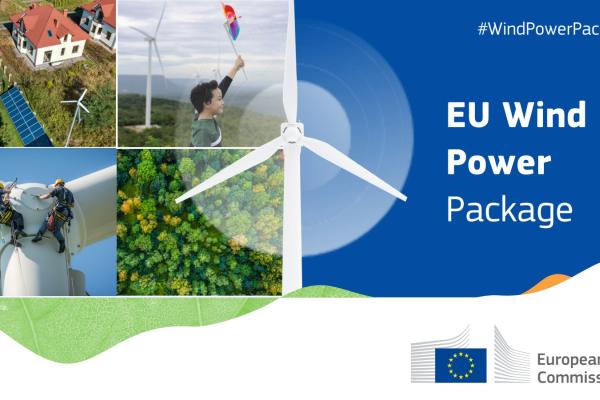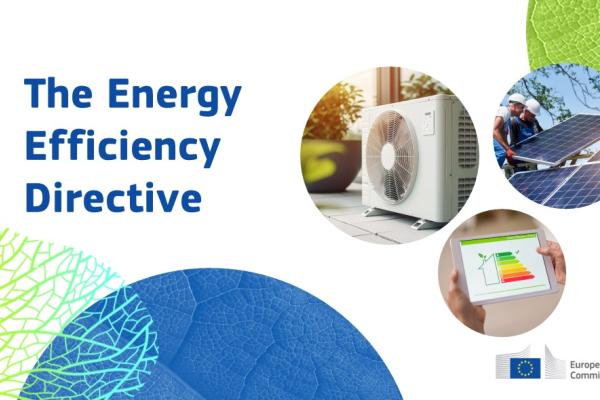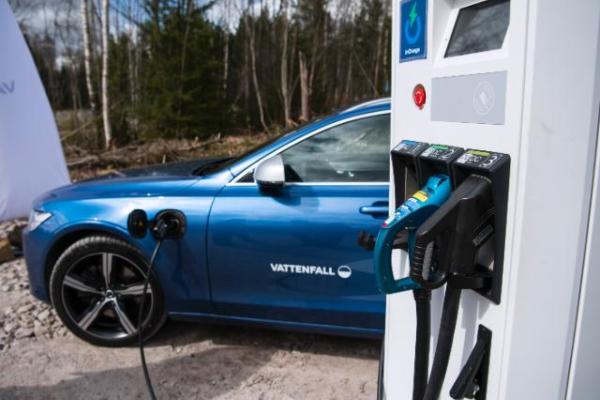A reliable supply of affordable energy to heat our homes and power our industries is something Irish people have taken for granted for as long as most of us remember.
However, climate change and Russia’s invasion of Ukraine have shown just how vulnerable Europe’s energy supplies actually are.
Russian fossil fuels have been used as an economic and political weapon, causing volatile energy prices and supply disruptions across Europe.
Meanwhile, the effects of climate change are already being felt across the world, making the delivery of secure, sustainable and affordable energy to citizens and businesses a matter of urgency.
The European Commission and EU Member States are building a resilient, clean energy infrastructure to bolster Europe’s collective energy security— and it is critical for Ireland, given its reliance on energy imports and vulnerability to price and supply disruptions. However, ongoing EU-funded projects are set to diversify Ireland’s energy sources and contribute positively to Europe’s overall energy strategy.
Green Deal
The Green Deal aims to make Europe the first climate-neutral continent by 2050, paving the way to affordable, secure, and sustainable energy for generations to come.
This ambitious plan focuses on three key principles for this clean energy transition.
1. Ensuring a secure and affordable EU energy supply.
2. Developing a fully integrated, interconnected and digitalised EU energy market.
3. Prioritising energy efficiency by developing a renewable-based power sector and improving building energy performance.
“From wind to steel, from batteries to electric vehicles, our ambition is crystal clear: The future of our clean tech industry has to be made in Europe.”
Ursula von der Leyen, European Commission President, State of the Union 2023.
To meet energy and climate targets for 2030, EU countries have published national energy and climate plans (NECPs) for the period from 2021 to 2030. These plans outline how each Member State intends to improve energy efficiency, increase the use of renewables and reduce greenhouse gas emissions.
Member States must submit a progress report and update their NECP every two years to reflect evolving ambitions of the Green Deal and the REPowerEU plan, which aims to rapidly reduce reliance on fossil fuels and enhance energy resilience across the EU.
Repower EU
Efforts to reduce Europe’s dependency on Russian fossil fuels began long before Russia’s illegal invasion of Ukraine. The EU Energy Union was set up in 2015 to reduce energy imports, and in 2022 the European Commission launched the REPowerEU Plan to rapidly accelerate the process.
REPowerEU includes ambitious but achievable targets and measures to save energy, diversify energy supplies, and speed up the roll-out of renewable energy sources to replace fossil fuels.

To meet REPowerEU targets, the European Commission proposed measures like the European Wind Power Action Plan. Wind power has been an EU success story and it currently generates around a third of Irish electricity. Future growth in the sector faces challenges that the Action Plan aims to address, such as insufficient and uncertain demand, complex planning rules and lack of access to raw materials.
Other proposals and measures to help achieve EU energy targets include:
- An EU solar strategy.
- The EU Energy Platform that includes a mechanism called AggregateEU to allow European companies collectively negotiate better energy prices on global markets.
- Doubling Europe’s heat pump deployment rate through a new action plan.
- Stimulating investment in sustainable domestic hydrogen through European Hydrogen Bank (EHB) auctions.
- An action plan to increase the production of biomethane gas, which is produced from waste organic matter and is one of the main renewable gases of the future.
- The introduction of mandatory energy labelling rules so consumers can make informed, energy-efficient choices to help reduce energy consumption across households and businesses.
Member States are being supported with their strategies to increase renewable energy sources through the Recovery and Resilience Facility (RRF), the main pillar of the EU’s post-Covid recovery plan. Overall, close to €270 billion is available in the form of grants and loans.
The REPowerEU - Two Years On progress report, published in 2024, shows that the EU has successfully met most of the Plan's targets, and is on track to achieve the medium to longer-term objectives.
Dependency on Russian fossil fuels has been overcome and natural gas demand throughout the EU fell by 18% between August 2022 and March 2024, although consumption in Ireland had only dropped by 4% up to January 2024.
Additionally, European Commission proposals to reform the EU Electricity Market and accelerate the use of renewables and phase-out dependency on gas were adopted and entered into force in July 2024.
These reforms, which include the right to fixed-price contracts, protect consumers from price spikes and market manipulation and ensure vulnerable citizens are safeguarded from having their electricity disconnected.
Towards energy independence
Many obstacles have to be overcome on the road to Europe’s energy independence, but progress is being made. Half of the EU's electricity generation came from renewable sources during the first six months of 2024 and the Climate Action Progress Report 2024 shows that net EU greenhouse gas (GHG) emissions fell significantly by 8.3% in 2023. Net GHG emissions are now 37% below 1990 levels, keeping the EU on track to reach its target of a 55% reduction by 2030.
The report states that the GHG reductions were clearly linked to acceleration of the energy transition, with energy industry emissions falling by a remarkable 18%.
Actions on energy taken by the European Commission include:
- Energy Security Measures: Actions to secure consistent energy supplies and affordable prices, including a Market Correction Mechanism, initiatives to accelerate renewable energy deployment and a crisis management framework to respond to supply disruptions.
- Energy Poverty Reduction: The Commission adopted a new Recommendation on Energy Poverty to address its root causes and ensure access to energy-efficient housing and domestic appliances. It’s estimated that 42 million people in the EU are unable to keep their home adequately warm and Member States must prioritise vulnerable consumers when introducing energy saving measures.
- Renewable Energy Targets: The EU Renewable Energy Directive has been reinforced, raising the binding renewable target for 2030 to 42.5% and almost doubling the existing share of renewable energy in the EU.
- AFIR Implementation: The Alternative Fuels Infrastructure Regulation (AFIR) came into force in 2024 to address issues in the transition to electric vehicles.
- State Aid on Energy: Member States are granted exemptions from EU State Aid rules for actions that speed up the transition towards a net-zero economy.
The Ninth State of the Energy Union Report, published in 2024, states that while the EU has successfully managed energy challenges by reducing gas demand and increasing the use of renewable energy, more efforts are needed to improve energy efficiency and address high energy prices.
EU Climate Action Progress Report 2024
Actions and measures on energy prices
Ireland and Energy
Being an island nation poses challenges for Ireland’s ability to fully integrate into the EU’s internal energy market, and the importance of developing cross border interconnections is highlighted in the REPowerEU Plan.
Around 80% of Ireland’s gas supply comes from the UK and following Brexit an EU-UK Specialised Committee on Energy was established under the EU-UK Trade and Cooperation Agreement (TCA) to govern and develop energy supplies.
Ireland currently lacks direct energy connections with the EU and has limited links with the UK, but this is changing thanks to several EU-funded energy projects. These include:
- A 575km Celtic Interconnector between France (La Martyre) and Ireland (Knockraha, Co Cork) which will deliver greater energy security and lower energy prices.
- A 190km underground electricity interconnector between the Great Island substation in Wexford and Pembroke substation in Wales.
- There’s also a proposed 360MW hydroelectric power station in Silvermines, Co Tipperary, that will transform a disused mining site into one of Ireland’s leading green energy facilities.

Ireland has much work to do in the transition away from fossil fuels like natural gas. According to the 2024 State of the Energy Union report, fossil fuels account for 86.4% of Ireland’s energy mix, compared to 69% across the EU.
However, progress has been made with almost 40% of electricity in Ireland now coming from renewable sources. In fact, Ireland is ranked third globally in wind capacity per capita and has the potential to become a key player in Europe’s offshore wind market.
Ireland is also one of nine EU members of the North Seas Energy Cooperation (NSEC) – a European Commission supported framework aimed at advancing development of offshore renewable energy in the North Seas, including the Irish and Celtic Seas.
Ireland’s rapid data centre growth, while vital for Europe’s green and digital transitions, presents another energy challenge.
Data centres can use the same amount of energy as a large town, and analysis from EirGrid shows they could account for 31% of Ireland’s total energy demand by 2027.
In response to European Commission concerns, Ireland’s latest National Energy and Climate Plan (NECP) includes strategies to manage the energy demands of data centres and outlines the need for a regulatory framework to balance their sustainable development with economic benefits.
At sectoral level, transport, buildings, and industry pose the greatest challenges to reducing GHG emissions. In Ireland transport emissions increased marginally by 0.3% in 2023. However, transport emissions are now reported to be 4.3% below pre-Covid levels, according to Ireland’s Environmental Protection Agency (EPA).
European Investment Bank (EIB) funding is also helping Ireland source renewable energy.
- The EIB is partnering with the Irish Department of Transport to improve port infrastructure needed for offshore wind projects, with potential investments estimated at €30 billion.
- The EIB and Bank of Ireland are co-financing a €100 million Bord na Móna wind farm project at Cloncreen, Co Offaly, that will be able to supply up to 55,000 homes with renewable energy.
- EIB finance of €65 million has been provided to help finance an onshore wind farm in Co Mayo.
Ireland also has EU State Aid approval for a Renewable Electricity Support Scheme (RESS), which uses cost-effective auctions for developers to bid on renewable electricity prices. Successful bids secure a guaranteed 15-year fixed-price contract.
Ireland’s Climate Action Plan sets out a roadmap on how the country will meet agreed EU emissions targets by 2030 and reach net zero no later than 2050.
Ireland’s Climate Action Plan 2024
Ireland’s energy facts
- Ireland’s greenhouse gas emissions dropped by 6.8% in 2023, largely due to reductions in agriculture and energy sectors.
- Emissions from electricity generation decreased by 17.2% in the first half of 2024, attributed to increased renewable generation and imported electricity.
- During the first half of 2024, solar power in Ireland increased by 75% (contributing 2.2% of total generation), while wind power rose by 5.9%.
- At the same time, imported gas rose to cover approximately 79.4% of total demand due to a 13.5% decline in indigenous supply from the Corrib gas field.
- According to Ireland’s Climate Change Advisory Council, failing to meet EU climate change targets could cost Ireland over €8 billion by 2030, primarily due to anticipated carbon credits shortages.
Energy News
- News article
The European Commission has put forward an Action Plan with short-term measures to lower energy costs, complete the Energy Union, attract investments and be better prepared for potential energy crises.
- 4 min read

- News article
The European Commission is calling on Ireland to comply with a judgment of the Court of Justice on the adequate collection and treatment of urban waste water and to fully transpose the Renewable Energy Directive.
- 3 min read

- News article
The European Commission has presented a European Wind Power Action Plan to ensure that the clean energy transition goes hand-in-hand with industrial competitiveness and that wind power continues to be a European success story.
- 6 min read

- News article
The European Commission has welcomed the final approval of the revised Energy Efficiency Directive, FuelEU Maritime Regulation and Alternative Fuel Infrastructure Regulation (AFIR), as part of the ‘Fit for 55' package of legislation to reduce EU greenhouse gas emissions by at least 55% by 2030.
- 1 min read

- News article
The Commission welcomes the political agreement reached between the European Parliament and the Council to boost the number of publicly accessible electric recharging and hydrogen refuelling stations in particular across the European Union’s main transport corridors and hubs.
- 3 min read
